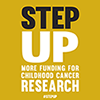After Treatment
Ending treatment is, for many families and patients, a time of great joy. It is associated with "success" and with relief at no longer having to endure the many treatments and intense schedules that have developed. Many families also experience gratitude for having "made it through and survived."
At the same time, families face a new set of uncertainties. There are new requirements for medical monitoring and adjustments to a "new normal" life. And now that active treatment is ending, the hospital staff and the other families fighting cancer who have become essential support are no longer involved on a regular basis.
Different families react differently to this stage, focusing on the joy, uncertainty, sense of abandonment, or some mix of emotions. Even members of the same family can find themselves reacting differently to the end of treatment. Children, particularly younger children, rarely experience anything other than joy at being done with treatment, while parents often have concerns about how best to monitor and care for their child on their own.
One of the most common reactions to ending treatment, particularly for parents, is a fear that the cancer will come back. This happens because while in treatment, there was a protocol, medication was given and active therapy took place, as did frequent monitoring. Without the formal therapies and frequent testing, parents may feel they are not actively fighting the disease. It is important to remember that treatment has ended and monitoring has been reduced based on experience that it is now safe to do so.
The pediatric oncology team recognizes the challenges families face during this transition period. Scheduling a visit at the end of therapy during which parents can ask the team their own questions can be very helpful in providing guidance for what to expect as you and your child move forward. Following are some questions that parents may ask when treatment is ending:- How often will we need to come back to the oncology clinic for check-ups, lab tests, scans, etc? How long will we continue to return for follow-up care?
- What types of tests and scan will be continue to be performed? How often? For how long?
- Do we call the oncology team for routine illnesses and “well child” care? If not, how is that care managed?
- If my child has symptoms and I’m not sure whether they’re due to a common illness or related to the cancer history, what should I do?
- What is the chance of the cancer coming back? If it does, when is the most likely time period? What are the most likely symptoms of the cancer returning?
- Should I still call the clinic if my child is exposed to Chicken Pox?
- How long will my child need to take Bactrim, Dapsone or Pentamidine (or any other medication the child may be taking)?
- When can my child’s central venous access device be removed? How is that done?
- When can my child resume his or her immunizations?
- Are flu shots recommended?
- Are there certain behaviors, symptoms, or side effects I should expect to see in my child that are typical for someone coming off therapy?
- What if my child has problems in school following therapy? What school problems might I expect for my child? Will the treatment team or hospital education consultant still be available to help with school adjustment or accommodation issues?
- What are common emotional reactions families experience when treatment ends? Are there any resources that can help us adjust to this new phase?
- What is the long-term follow up plan for my child? Is there a written summary of treatment and follow-up you can give me?
- Will my child be followed in a long-term follow-up program at some point? When would that happen and where would we go?
- Are there resources to help us transition to adult-based care when my child becomes a young adult?
The First Month off Treatment
Two to Six Months off Treatment
Six to Twelve Months off Treatment
One Year off Treatment and Beyond
Young Adults Transitioning to Adult-Focused Care
Long-Term Follow-Up Care
Late Effects of Osteosarcoma
The potential late effects following treatment for osteosarcoma depends on the therapy received and the age of the child when the treatment was received, as well as many other factors.
There are a couple of very important resources that you should be aware of as a survivor of children’s cancer. The Childhood Cancer Survivor Long-Term Follow-Up Guidelines, available at www.survivorshipguidelines.org, is a comprehensive set of healthcare screening guidelines designed for use by health care providers. In addition to the guidelines for healthcare providers, there is a series of Health Links that contain important information for patients regarding their long-term health. These Health Links cover a wide range of topics to assist patients in managing their ongoing health care. Your healthcare provider can review them with you.
Survivors of all cancers will benefit from learning more about the following topics:- Reducing the risk of second cancers
- School and learning issues after children’s cancer
- Finding appropriate healthcare after children’s cancer
- Emotional issues after children’s cancer
- Kidney health after treatment for children’s cancer
- Hearing problems after children’s cancer
- Heart problems after treatment for children’s cancer
- Liver health after children’s cancer
- Reproductive issues after treatment for children’s cancer
- Keeping your bones healthy after children’s cancer
- Limb salvage after bone cancer
Last updated July, 2011
About Osteosarcoma
Just Diagnosed with Osteosarcoma
In Treatment for Osteosarcoma








